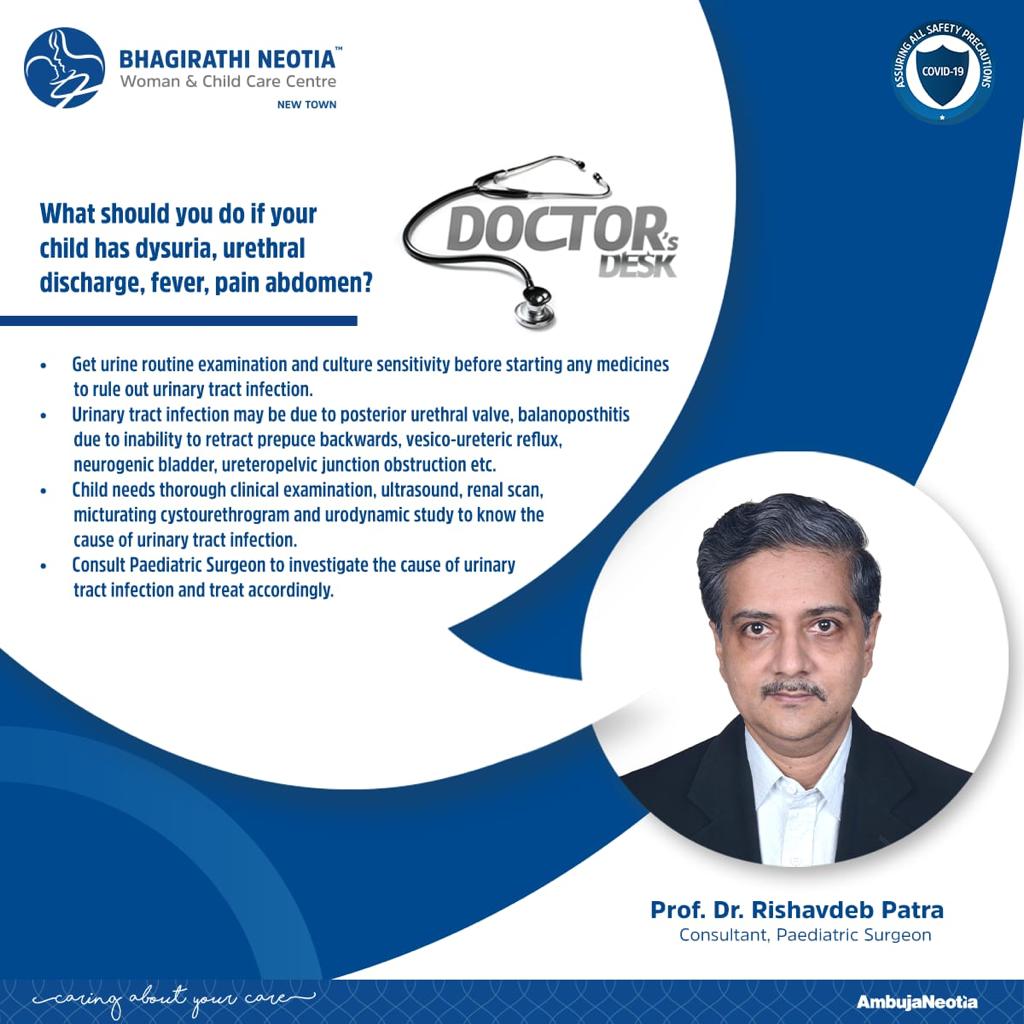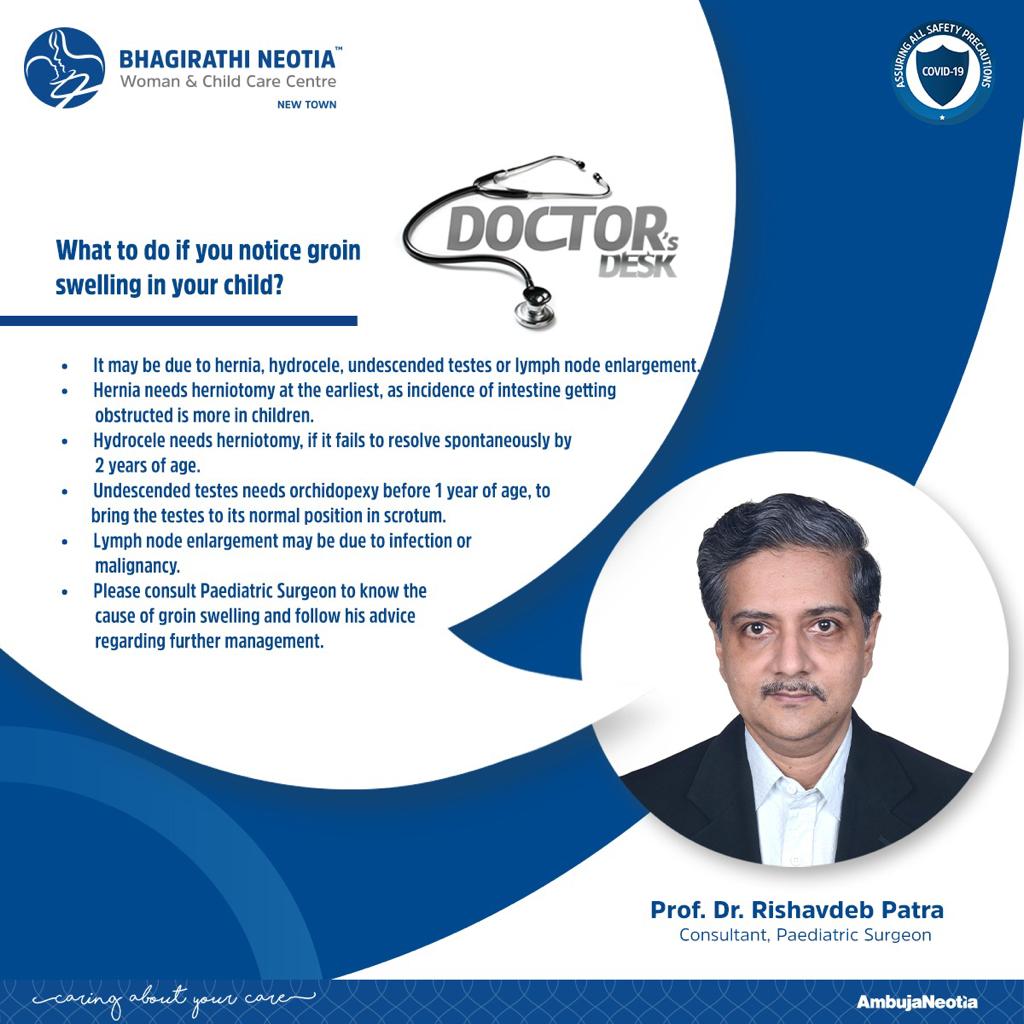Pediatric Urology
• Hypospadias – Urethroplasty.
• Undescended testes – Orchidopexy.
• Phimosis – Prepucioplasty/Circumcision.
• Hydronephrosis – Pyeloplasty.
• Posterior urethral valve – Cystoscopic fulguration.
• Reconstructive urology – Intersex anomalies, Neurogenic bladder, Vesicoureteric reflux, Exstrophy bladder etc.
• Bedwetting, urinary infection management.
UTI In Children - Understanding The Ways It Can Be Treated!
UTI stands for urinary tract infections. In children a urinary tract infection (UTI) is a very common condition caused by bacteria. Bacteria that enter the urethra are flushed out through urination. But, when bacteria aren’t excluded out of the urethra, they may grow in the urinary tract and cause infections. The Survey state that up to 8% of girls and 2% of boys will get a UTI at an early age. Sometimes the symptoms of UTI are hard to detect in kids so it is better to get your child treated, as it turn into serious kidney diseases. With a right treatment your child will feel better within few days.
Symptoms of a UTI include :
1. Burning and pain during micturation.
2. Urgent need to go, but having a few drops of urine.
3. Fever and vomiting commonly occur during UTI.
4. Foul smell and cloudy urine.
Causes :
1. Bladder outlet obstruction like posterior urethral valve in males
2. Vesico ureteric reflux (VUR)
3. Uretero pelvic junction obstruction (UPJ Obstruction)
4. Constipation: Being constipated makes difficult to empty your bladder, which means trapped bacteria which increases risk of UTI. So in order to reduce the UTI risk, avoid constipation
5. Dehydration: Drinking water not only quenches your thirst, but it also avoids the risk of getting UTI. We should drink enough water so that we can flush out bacteria that can cause UTI. Drinking water also avoids the constipation problem.
6. Holding urine: Holding urine for 6 hours make UTI more common as bacteria in the bladder has lots of time to grow and cause infection. So ask your child to pass urine after few hours.
Prevention :
1. Avoid tight fitting clothes, especially for girl children.
2. Drink more and more liquids and eat fibre rich food.
3. Change the diaper of young child frequently.
4. Ask your child to go for urine immediately rather than holding.
5. Don’t give bubble bath to the child as it is a major source of bacteria.
Investigations :
1. USG (KUB)
2. Urine routine examination and culture sensitivity
3. MCU (Micturating Cysto Urethrogram)
4. Urodynamic study
5. DTPA Scan
6. DMSA Scan
Treatments :
The most common antibiotics used for treatment are:Amoxicillin and Clavulanic acid, Sulfamethoxazole-trimethoprim, Ofloxacin, Cefixime, Cephalexin etc Sometimes hospitalization is necessary in younger than 6 months old, if:
1. The Child has a high fever and not improving
2. The child is vomiting and having dehydration.
In case you have a concern or query you can always consult an expert & get answers to your questions!
How Surgery Can Help Manage Swelling Of Penis?
Phimosis, Paraphimosis are the two major issues which occur in males In Phimosis, the foreskin is not easily pulled back from the tip position of the penis. Normally, this problem takes place in younger children and this is not a serious condition. With spontaneous erections and natural manipulations, more than 90% of foreskin becomes retractable by age 3 to 4 years. Few require Preputioplasty and Circucision is reserved for Balanitis Xerotica Obliterans. Paraphimosis, is quite a painful condition which needs to be treated urgently. Paraphimosis is the condition in which the foreskin is pulled back or get stuck in the same position. Due to this the retracted foreskin, as well as the penis part, becomes swollen.
In this condition, the fluid will build up, and thus the foreskin cannot be returned to its original position. If anyone ignores it then it can lead to major issues. This can have an effect on blood flow to the tip of a penis. And, if not treated on time then the tip of the penis can get damaged.
The insect bite is a condition which can cause swelling of the phallus and prepuce. This can be easily treated by medicine. Differential diagnosis include Penile edema, which is related to insect bites, allergic reactions, and trauma.
Causes of Phimosis and Paraphimosis:
1. Scar tissue: Any kind of infections can create the scratch marks on the foreskin. This can also affect the penis. Thus because of tough tissues, it is somewhat difficult to pull it back. Pull and stretch: It is important that one should not forcefully move the foreskin. Pulling it or stretching the tip of penis vigorously can cause inflammation.
2. Medical conditions: If anyone is suffering from diabetes, then there are chances of having a infection known as balanitis. This is typically an infection which takes place at the tip of the penis.
Thus, in this case, it is necessary to discuss the problem with your doctor. Therefore, after going through your complete medical history, he can suggest you the best treatment which can manage the swelling of the penis.
Why Paraphimosis happens?
1.Mishandled foreskin 2. Piercing
Treatment and cure for Paraphimosis:
The manual reduction is the first treatment which is suggested by your doctor. In this procedure, analgesic is given as a pain killer through the mouth. Other than this local anesthetic block is applied to your penis. Or applying anesthetic jelly in the local area is quite helpful during manual reduction. Injections of hyaluronidase are also effective to decrease the swelling. In case you have a concern or query you can always consult an expert & get answers to your questions!
Urinary Tract Infection (UTI) - Know Surgical Causes Of It In Children!
Children are more susceptible to infections than adults because
their immune system is not fully developed. Moreover, they don't
know the importance of practicing good hygiene.
If a child undergoes surgery of the abdomen or related organs such
as, stomach, intestine kidney, bladder or urethra, the child stands
the chance of contracting a urinary tract infection from a bacterial
infection.
Causes:
The surgical cause of the urinary tract infection in the child can
occur due to bacteria and other organism left after surgical
intervention. Urinary tract infection in children commonly occur due
to congenital anomalies like Posterior Urethral Valve (PUV),
Vesico-Ureteric Reflux (VUR), Uretero-Pelvic Junction Obstruction
(UPJ / PUJ Obstruction) etc. The most common organisms in the
urinary tracts are strains of Escherichia coli that are specifically
attached to the transitional epithelium of bladder.
In the Pediatric age groups, E. coli causes more than 80 to 90
percent of Urinary Tract Infections. Other bacterial causes of
urinary tract infection are: Klebsiella, Proteus Mirabilis,
Enterococci etc
Symptoms:
Common symptoms of a UTI are:
• Pain or burning sensation during urinating.
• Frequent urge to urinate.
• Foul smell in urine.
• Change in the colour of urine.
• Blood in the urine.
• Urinary incontinence.
• Fever.
• Loss of appetite.
• Nausea.
• Vomiting.
• Pain in the lower abdomen.
If one or more of these symptoms persist for over three days or
recur, the child needs medical attention.
Diagnosis:
A surgical intervention for any reason in the digestive tracts and any other organs in the abdomen area may increase the risk of urinary tract infection in children. The doctor will diagnose a urinary tract infection based on the symptoms. Diagnosis involves testing a urine sample for bacteria. If a child has the tendency of getting urinary tract infection more than once in a short span of time, especially a male child; the child might need to consult a Pediatric Surgeon to rule out congenital anomalies in urinary tract like Posterior Urethral Valve (PUV), Vesico-Ureteric Reflux (VUR), Uretero-Pelvic Junction Obstruction (UPJ / PUJ Obstruction) etc. Ultrasound, MCU, DMSA Scan, DTPA Scan, Urodynamic study and MRU are required for knowing the cause of urinary tract infection..
Treatment:
Treatment of UTI involves anti-bacterial medication. Apart from
that, hygienic practice like the following is recommended to avoid
recurrence of infection:
• Front to back wiping.
• Not holding the urination for long periods.
• Drinking plenty of water to dilute any bacterial content in urine.
• Washing hands before wiping private parts.
• Avoiding excessive sweet food and beverages.
These practices help treat the existing urinary tract infection and
also prevent further infection. If symptoms recur anyway,
consultation with a Pediatric Surgeon is recommended.
Take Away Message:
Urinary tract Infection is a bacterial infection of the urinary tract. It is more common in girls and children. A urinary tract infection is generally characterized by the strong sense of urination but no urine, along with other symptoms such as burning sensation while urinating, foul smell of the urine, frequent urination, fever, nausea, etc. The common cause of urinary tract infection is the spread of E. coli bacteria in the urinary tract. This risk increases with surgical intervention in the digestive and urinary tract surgery in children. For the treatment, it is recommended to consult a Pediatric Surgeon.


